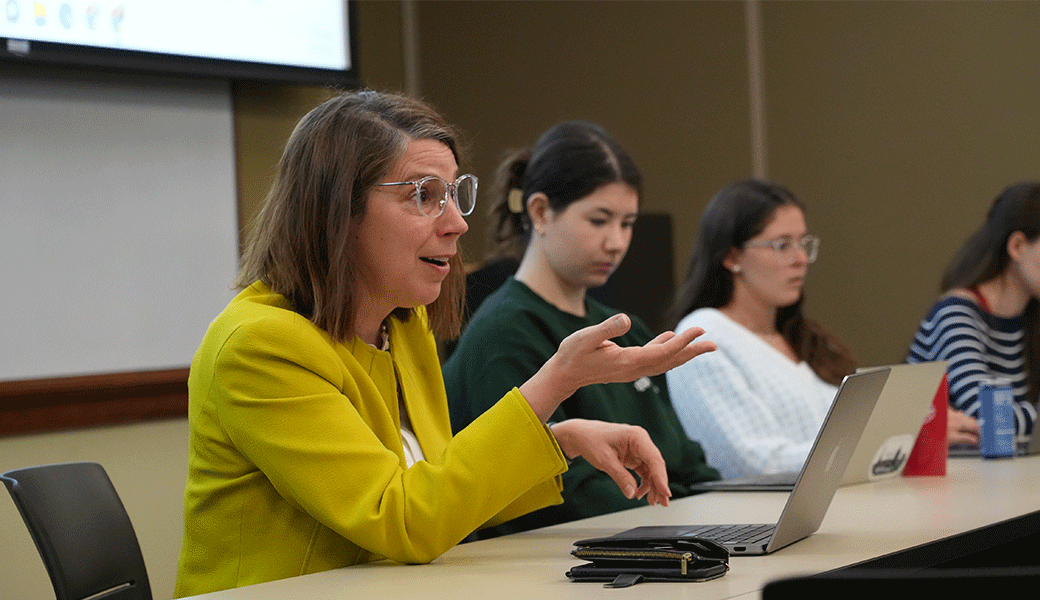Learning in Service to Justice: The Poverty Studies Interdisciplinary Minor

Notre Dame’s mission statement calls for the creation of “a sense of human solidarity and concern for the common good that will bear fruit as learning becomes service to justice.” The poverty studies interdisciplinary minor (PSIM) aims to do just that.
PSIM is housed in the Center for Social Concerns—an “interdisciplinary institute dedicated to justice education and research for the common good with communities near and far.”
The minor was designed so that students can, “pursue any career, but will do that with the ‘disciplined sensibility to poverty and injustice’ Notre Dame’s mission calls us to practice,” says Connie Mick.
Mick is the director of the Poverty Studies Interdisciplinary Minor, in addition to her role as senior associate director and the director of academic affairs at the Center for Social Concerns. She teaches two core courses: Introduction to Poverty Studies and the senior capstone course.
In addition to these courses, PSIM students fulfill a three-credit “experiential learning” requirement completed by taking three Center for Social Concerns seminars throughout their undergraduate years or by participating in a summer program such as NDBridge. These experiences bridge the gap between learning in the classroom and engaging with relevant issues firsthand.
“We don’t just want to study poverty in a distant, academic way; we want to be in solidarity with those who need the most and deserve our best,” says Mick. “The Center for Social Concerns provides those life-changing opportunities to engage poverty person-to-person with the support of faculty who deepen students’ understanding of the injustice they encounter.”
The elective course Poverty, Business, and Development exposes students to key content, frameworks, and perspectives regarding how poverty is addressed in the business community. In Consulting and Development, students work with low-income and disadvantaged entrepreneurs, helping to develop sustainable enterprises that change participants’ economic circumstances for the better.
Michael Morris, a professor affiliated with poverty studies, teaches both mentioned electives in the minor. He points to the nuance that Notre Dame’s program provides compared to other institutions.
“We approach poverty from a wide range of disciplinary perspectives,” says Morris. “Our educational approach to poverty places a priority on experiential learning.”
The emphasis on the experiential learning that poverty studies requires allows students to, “engage these hard questions with passion and empathy that expands through understanding,” says Mick.
Empathy is developed through involvement in these external communities and is also cultivated within the classroom.
“I’ve found a really wonderful academic community,” says junior Halle Keane. “Everyone I’ve met through the minor cares deeply about creating a more equitable world.”
Studying economics and Spanish, Keane added poverty studies after meeting with Mick in the spring of her first year.
“After confronting the income inequality in my hometown during high school, I knew I was interested in studying poverty in college,” says Keane. “After learning about the minor’s flexibility of curriculum and Professor Mick’s passion for interdisciplinarity in anti-poverty work, I was sold.”
Keane has seen her work in the minor translate to other aspects of her Notre Dame experience.
For example, through the Kellogg International Scholars Program, she conducts research regarding indigenous peoples’ autonomy in 16th-century Panamá. While Keane says that the research isn’t affiliated with the poverty studies minor, she does, “draw on a lot of themes from the minor,” in her research. She recognizes PSIM’s careful examination of justice, marginalization, and the legacies of systemic oppression through her work at Kellogg.
Keane’s favorite aspect of the minor is its interdisciplinary nature. She has taken classes ranging from Professor Dan Graff’s Just Wage Research Lab to Music and Social Change in the USA. In addition, she traveled to the southern U.S. in spring 2023 with the Center for Social Concerns’ Civil Rights course.
“If there’s something I want to study or a discipline I want to explore, I am able to follow my curiosity through the poverty studies minor,” says Keane. “[The program serves as] an academic anchor for me on campus, a field of study through which I find supportive peers and professors and complete significant academic discernment.”
Learn More
Explore the poverty studies interdisciplinary minor.
More Notre Dame programs:
- Considering Civil Engineering? Three Students on Why They Chose the Major and What They Love About It
- Psychology Major Q&A: Three Current Students on Why They Chose Psychology
- Student Q&A: Irasema Hernandez Trujillo '24 on How the Global Affairs Major Equips Students to Become Future Policy Makers and Advocates
Latest Admissions Blog
- What's Next for These ND Grads? Six Seniors Share Their Post-Grad PlansAfter graduating from Notre Dame on May 18, 2025, the Class of 2025…
- Finding Purpose in History, Community in the Present: Ashley Estelle’s Notre Dame JourneyWhen Ashley Estelle ’26 arrived at Notre Dame from Birmingham, Alabama, she knew she was excited to begin her college experience—but she wasn't quite sure yet what her path would be. Now a junior, Estelle is pursuing a major in history with minors…
- Sports Broadcaster and Undergrad JJ López '27 is Writing His Story with the Fighting IrishJJ at the Desk for ESPN's College Gameday in fall 2023 Since he was young,…
- Maggie Enrietto ’25: Bridging Business, Law, and LiteratureWhen Maggie Enrietto '25 arrived at Notre Dame, she wasn’t entirely sure what she wanted to study. A spark of interest in business, thanks to an…
- Riley Carlin ’27: Engineering a Future in InnovationRiley Carlin’s fascination with problem-solving began long before he set foot…
- University of Notre Dame Releases Regular Decision Admissions DecisionsNOTRE DAME, IN – The University of Notre Dame has released its Regular Decision admissions decisions for the Class of 2029, concluding another admissions cycle. With a record number 35,401 REA and RD applicants, the University admitted 9% of those who applied, selecting students distinguished not…






